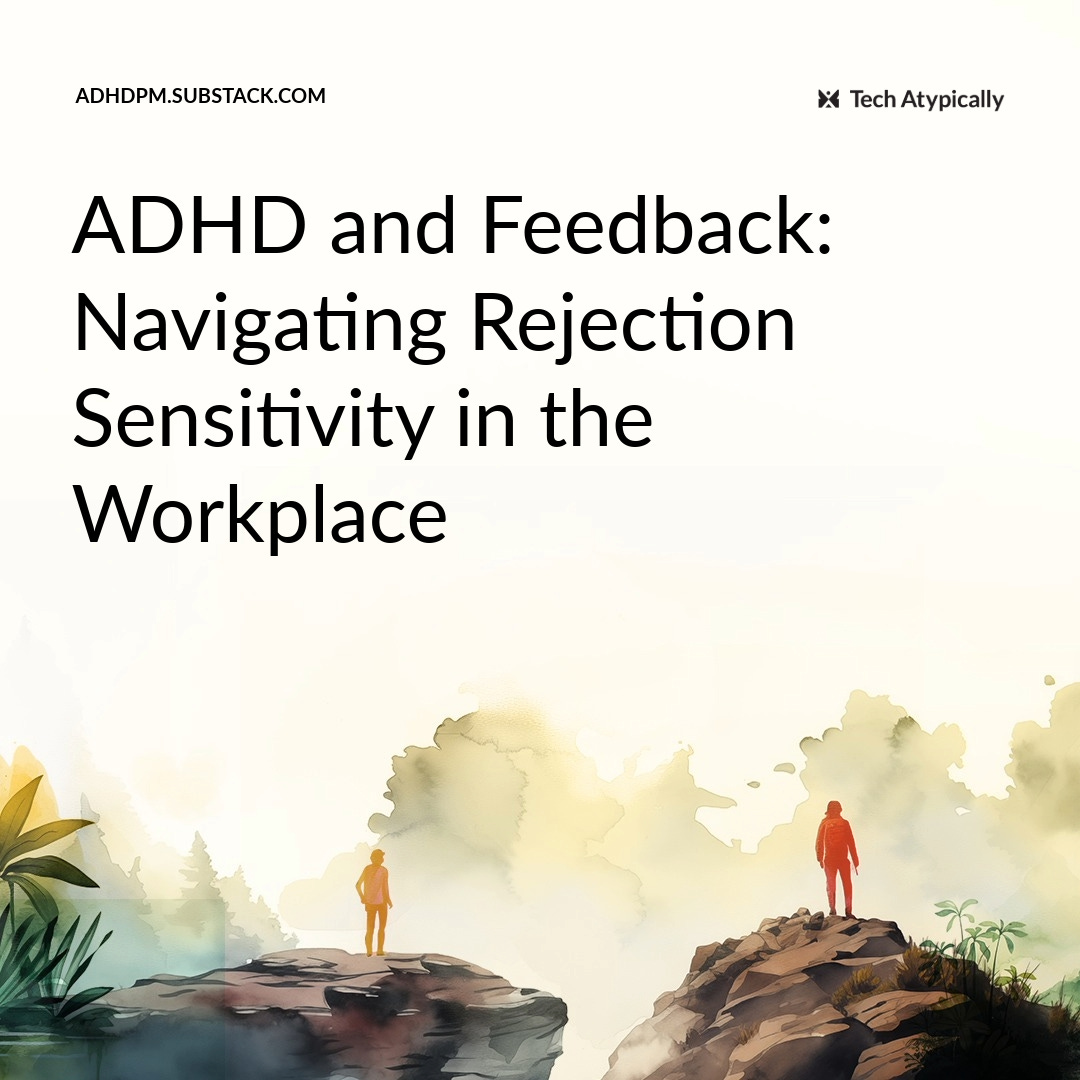#59😬 ADHD and Feedback: Navigating Rejection Sensitivity in the Workplace
How redefining feedback as a data point and a gift reduces the pain of RSD.
Welcome to Tech Atypically 👋, your weekly blog for navigating the challenges of ADHD and being in the tech industry.
I am a coach specializing in ADHD and product management, and I help you change one belief and take one action each week.
Part 2 of the Performance and Productivity series.
🐼Tackle your challenges of working in tech and having ADHD with me
🦋The Takeaways
Belief: Feedback feels like a direct judgment of my life.
Reality: Feedback is a data point, often distorted by rejection sensitivity dysphoria.
Action: View feedback as a gift; it’s what you make of it.
⭐Introduction
One of my biggest struggles is listening to feedback, regardless of the source. Whether it comes from my wife, my best friend, my coworker, or even a random person on the internet, I find it difficult to listen to.
I brace myself for it and can't wait for it to be over. Positive or negative, all feedback feels painful. Whatever it is, I try to purge it from memory as fast as I can…unless I can’t (ADHD rumination, yay!)
In today's issue, I explore how to develop a healthier relationship with feedback to improve work performance.
😬The Belief - Feedback is a judgment of me
Feedback is an essential aspect of life and work, providing insights into how others perceive your actions and words.
Why is it so difficult for people with ADHD to deal with feedback? For me, it comes from this underlying belief that feedback, negative and positive, is a judgment. Not just of the work I do, but my entire existence. It’s a signal from the world that what I did sucks and everything I do sucks.
This experience is so prevalent for people with ADHD, that there’s a medical term for it: Rejection Sensitivity Dysphoria or RSD.
RSD is “the experience of severe emotional pain because of a failure or feeling rejected…People with RSD are also more likely to interpret vague interactions as rejection and may find it difficult to control their reactions” (source).
In other words, my emotional response to interactions with others is often exaggerated compared to the true impact of the interaction.
If my manager were to tell me "Great job on the first draft of your paper, keep going”.
My self-talk and emotions say “Nice job messing up on your first attempt. I don’t want to tell you the truth so here’s a feigned act of encouragement to mask my pity for you. I should probably quit my job and find a different industry”.
Now imagine experiencing a version of this every time you interact with anyone. It’s exhausting but it’s a common ADHD experience. One author reported nearly 100% of their ADHD patients reporting they experienced RSD in their life at some point (source)1.
Another author reports that “One-third of my adult patients report that RSD was the most impairing aspect of their personal experience of ADHD, in part because they never found any effective ways to manage or cope with the pain.” (source)
The struggle is real and a manager telling you to “not get emotional” about feedback at work is mean and only pouring more gas on the fire.
😬The Reality - Feedback is a data point
I recently found one of the best pieces of advice for my RSD in an interview with Google PM director Ebi Atawodi on
podcast. In the interview, she talks about the importance of raw feedback and being loved. Love is defined as “the choice to extend yourself for the spiritual growth of oneself or another”(source).When you are loved, when you give people hard feedback “they know that it's in their best interest because I've shown enough times that I genuinely care about the person behind the role.” When you receive hard feedback from someone who cares about you, you know it's for your benefit.
Feedback is not a judgment; it’s a data point. It's a signal of how the world perceives your actions. Your responsibility is to interpret these data points and make informed choices.
Feedback may feel like a judgment in the worst ways but remember your feelings may not align with reality due to RSD.
And that’s OK. You’re different, not broken.
😬The Action - Feedback as a gift
Consider my friend Brandon’s idea that "Feedback is a gift." This might resonate with you more when you view your ADHD as a gift – not a superpower or a weakness, but something with its own set of challenges and advantages.
A gift is what you make of it.
Similarly, workplace feedback is an opportunity for growth. When receiving feedback, show respect by listening openly, and understanding that the giver heard you.
Let me translate that sensible line into ADHD speak for you:
You keep emotional shit/RSD together while they talk and listen.
Remind yourself it’s just data points while self-soothing.
And try to be as present as you can by listening to what’s in front of you and not in your head.
Feedback is a gift, not a judgment. RSD is a bitch. You deserve to be loved though, so keep listening to feedback while surrounding yourself with people who love you as you are.
✨Conclusion
Whether it’s at work or home, being able to let feedback from others into your life is how to practice love. It’s how you grow and help others grow.
It’s scary and painful though. I feel RSD all the time but I keep showing up. I keep showing up because eventually, I’ll be the person I hope to be. Maybe I’ll become the person people tell me I already am but can’t accept for myself.
I don’t know. I’ll keep trying though because I’ll still be better than the person I was yesterday.
🐼Want to talk to me privately about your ADHD struggles?
⏭️Next Week
Navigating Manager Meetings with ADHD: Active Listening & Speaking Skills
My literature review on RSD prevalence in ADHD came back with mixed results with concrete numbers. The best I found was one paper that reported “significant prevalence” but I could not add up their findings to a summary in a meaningful way. Another author interpreted that same paper with a 35-70% prevalence of RSD but I couldn’t confirm that math in my review. Shoutout to my friend Dr. Megan if you’re reading this and appreciate my nerdy science work.





Connecting feedback with love is so beautiful!
I recently did a quick dive into research on emotional dysregulation, including the Soler-Gutiérrez et al. review you cite here. I was really interested to see that researchers are advocating for emotional dysregulation to be listed as a fourth "official" ADHD symptom. I wasn't able to find any research published on RSD yet, which surprised me -- it is so widely discussed in ADHD communities, I think we definitely need research about it as well!
I wrote about it here: https://adhdunpacked.substack.com/p/rejection-sensitive-dysphoria-adhd
This is so helpful ✨